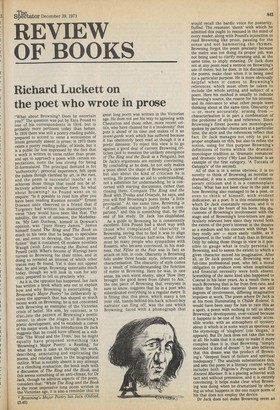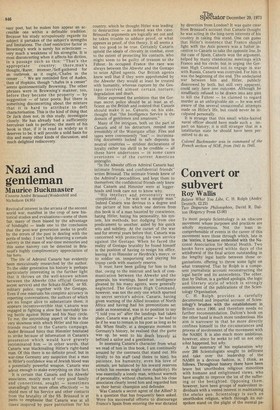Richard Luckett on the poet who wrote in prose
"What about Browning? Does he entertain you?" The question was put by Ezra Pound to one of his correspondents in 1916, but is probably more pertinent today than before. In 1916 there was still a poetry-reading public, prepared to accord to verse a seriousness of intent generally absent in prose; in 1973 there exists a poetry reading public, of kinds, but it is a public far less impressed by the fact that a work is written in verse, rather than prose, and apt to approach a poem with certain expectations, none the less strong for being ill-formulated. The principal demand is for 'authenticity'; personal experience, felt upon the pulses though clarified by art, is the root, and the poem is successful insofar as it achieves those things that could not be effectively achieved in another form. So what about Browning? As Pound went on to enquire: "Is it possible to read him after you have been reading Russian novels?" Ernest Dowson once observed to a friend that if Turgenev had written his masterpieces in verse "they would have been like that. The subtility, the tact of omission, the Morbidezza. 'My Last Duchess,' himself in Dowson's • opinion, was "pure Henry James." James himself found The Ring and The Book so much to his taste that he began to speculate on, and even to develop, the "latent prose fiction" that it contained. Of modern novelists Waugh (with Love among the Ruins) and Powell (with What's become of Waring) have turned to Browning for their titles, and in doing so revealed an interest of which other traces may be found. Yet it does not appear that, by and large, Browning entertains much today, though we will look in vain for any critic prepared to tell us precisely why.
As it is, the opposite has happened. Ian Jack has written a book which sets out to explain how and why Browning is entertaining. In Browning's Major Poetry* he deliberately ignores the approach that has shaped so much recent work on Browning: he is not concerned with Browning as exemplar of the Victorian crisis of belief. His aim, by contrast, is to eluciJate the pattern of Browning's poetic career, to show the stages of Browning's poetic development, and to establish a canon of his major work. In his introduction Dr Jack suggests that he could have offered as a subtitle 'The Wood and the Trees,' but he might equally have proposed something like 'Browning's Major Poetry: a Reading,' for what he does is take us through the work, describing, annotating and explicating the poems, and relating them to the biographical outline. What is notably absent is any attempt at a clinching evaluation; the book ends with a discussion of The Ring and the Book, and this seems something of an anti-climax, for Dr Jack, though he admires aspects of the poem, considers that: "While The Ring and the Book is the most impressive long poem written in the Victorian age, it is also a reminder that no * Browning's Major Poetry Ian Jack (Oxford, 0.40) great long poem was written in the Victorian age. He does not see his way to agreeing with Chesterton and those other, more recent critics, who have claimed for it a 'modernity' that puts it ahead of its time and makes of it an avant-garde work which has suffered because it has obstinately been read as though it is a poetic dinosaur. To reject this view is to go against a good deal of current Browning criticism (not to mention the unlikely emergence of The Ring and the Book as a Penguin), but Dr Jack's arguments are entirely convincing. By concluding as he does, he not only makes a point about the shape of Browning's career but also about the kind of criticism he is writing. He provides an aid to understanding, not a substitute for understanding; he is concerned with starting discussions, rather than closing them. Compare The Ring and the Book with Troilus and Criseyde, he says, and you will find Browning's poem looks "a little provincial." At the same time, Broliming is "of sufficient stature to justify such a comparison," and this is something that, by the end of his study, Dr Jack has established.
As a guide to Browning he is consistently excellent. Ezra Pound had a short way with those who complained of obscurity in Browning, saying that to find it was to align oneself with Victorian half-wits. But there must be many people who sympathise with Rossetti, who became convinced, in his madness, that Fifine at the Fair was in fact an attack on him, in code. Obscurity in Browning falls under three heads: style, reference and characterisation. The obscurity of style comes as a result of misunderstanding the function of metre in Browning. Here he was, in one sense, his own worst enemy, since 'How they brought the good news from Ghent to Aix,' the one piece of Browning that everyone is sure to know, suggests that he is a poet who subordinated everything to a regular metre. It is fitting that this piece, which many a ten year old, hands-behind-his-back school-boy narrator can fling off, was the one which Browning, faced with a phonograph that
would recall the bardic voice for posterity, fluffed. The resonant 'damn' with which he admitted this ought to resound in the mind of every reader, along with Pound's injunction to read Browning like prose, pausing for the sense and not hammering the rhymes. Browning forgot the poem precisely because the metre was not doing its proper job, was not being used to clarify meaning and, at the same time, to imply meaning. Dr Jack does not at any point read a sermon on Browning's use of metre, but he does, in his discussion of the poems, make clear when it is being used for a particular purpose. He is more obviously helpful when it comes to Browning's references, which must often be taken to include the whole setting and subject of a poem. Here his method is usually to indicate Browning's source, the reason for his interest, and its relevance to what other people were thinking about at the same time. Obscurity of — or, more accurately, arising from — characterisation is in part a combination of the problems of style and reference. Since Browning's finest poems are monologues, spoken by particular characters at a particular time, the style and the references reflect that fact. Dr Jack manages not only to put a proper emphasis on this, but also to refine the notion, using for this purpose Browning's definitions of forms within the dramatic monologue tradition as 'dramatic romances' and 'dramatic lyrics' ('My Last Duchess' is an example of the first category, 'A Toccata of Galuppi's' of the second).
All of this is in a sense obvious; it is no novelty to think of Browning as novelist or dramatist; it was a commonplace of contemporary criticism and it is a commonplace today. What has not been clear in the past is how Browning also managed to be a poet, or even to think of himself, with evident dedication, as a poet. It is this relationship to which Dr Jack constantly returns, and it is this that is at the heart of his book. His discussions of Browning's involvement with the stage and of Browning's love-letters are particularly relevant here since they reveal both the extent of the poet's interest in the theatre as a medium and his concern with things 'as they really are' — more easily visible, as it happened, in the 'exile' of Italy than in Britain. Only by taking these things in view is it possible to gauge what is truly personal in Browning, and to assess the extent to which a given character moved his imagination. After all, as Dr Jack points out, Browning was a full-time professional poet, who felt a moral obligation to produce even when inspiration and financial necessity were both absent. Something of the same kind also happened to Conrad in his later years. As a result there is much Browning that is far from first-rate, and within the first-rate material there are still degrees of involvement, differing imaginative impulses at work. The poem where Dr Jack is at his most illuminating is Childe Roland. It would have been easy for him to rate this as a sport, a poem with nothing to tell us about Browning's development, over-valued because it happens to be one of his most easily accessible works, with an atmosphere of mystery about it which is in some ways as spurious as the etymology of 'slughorn' (via 'slogan,' it appears). But Dr Jack does not take this view at all. He holds that it is easy to make it more complex than it is, that Browning "simply recorded 'a kind of dream' "; he also believes that this dream was the product of Browning's "deepest fears of failure and spiritual inadequacy." The analysis substantiates this, and sets the poem in a literary context which includes both Pilgrim's Progress and The Ancient Mariner. It is a placing achieved with tact and without pretension, and it is entirely convincing. It helps make clear what Browning was doing when he dramatised by showing us what happens in the one major poem of his that does not employ the device.
Dr Jack does not make Browning seem an
easy poet, but he makes him appear an accessible one within a definable tradition. Because his study scrupulously regards its subject it partakes of the subject's strengths and limitations. The chief restrictive factor in Browning's work is surely his eclecticism — very much a weakness of his strengths. It is most disconcerting when it affects his diction, in a passage such as this: "That's the appropriate country; there,man's thought,/Rarer, intenser,/Self-gathered for an outbreak, as it ought,/Chafes in the censer ..." We are reminded first of Auden, then of Hopkins, though "chafes in a censer" seems quintessentially Browning. The other phrases were in Browning's manner, to'o, before they became the property — by suggestion — of later poets. But there is something disconcerting about the mixture that it is hard to attribute to deft characterisation. This is the kind of thing that Dr Jack does not, in this study, investigate closely. He has already had a sufficiently herculean task to perform; the merit of his book is that, if it is read as widely as it deserves to be, it will provide a solid basis for this and many other kinds of discussion, and much delighted rediscovery.



























 Previous page
Previous page